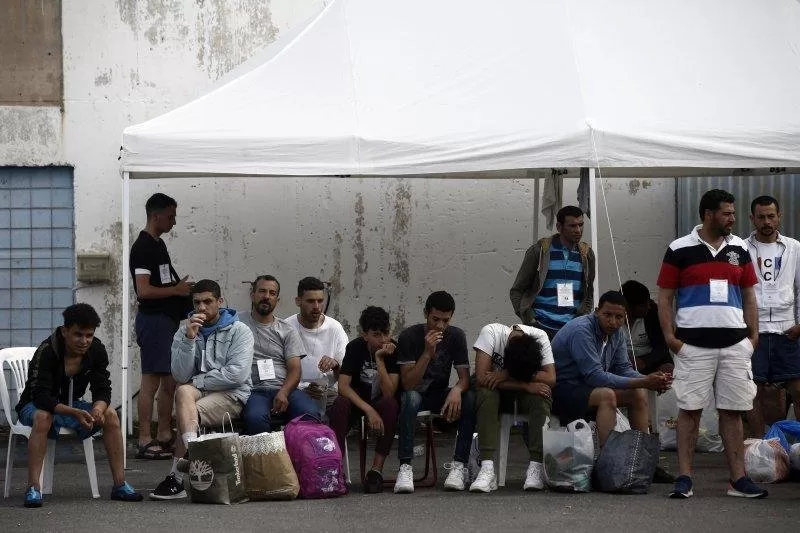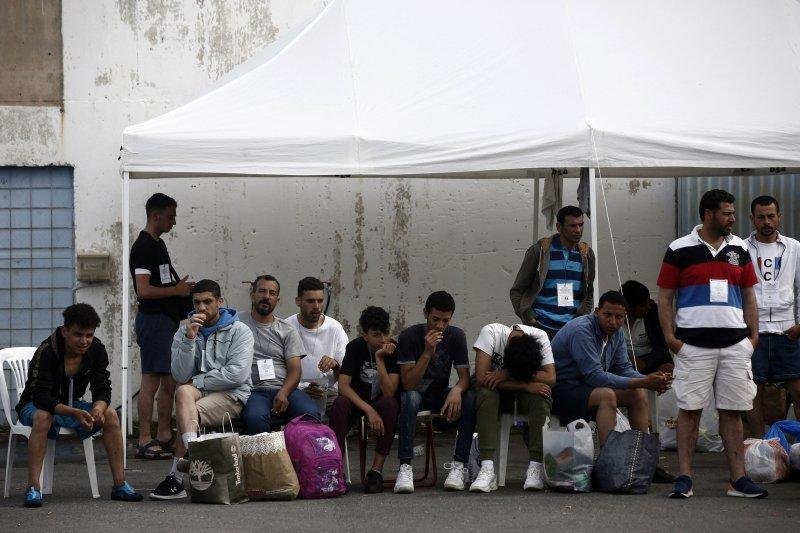The European Union adopted landmark reform of the 27-country bloc’s migration and asylum system with new rules designed to process arrivals in an orderly and efficient way, standardize procedures and relieve pressure on front-line nations. File Photo by Yannis Kolesidis/EPA-EFE
May 14 (UPI) — European Union member states on Tuesday adopted landmark reform of the bloc’s migration and asylum system with new rules designed to process arrivals in an orderly and efficient way, standardize procedures and relieve pressure on front-line nations.
The 10 new laws adopted by a European Council meeting in Brussels include triaging of arrivals at the border, enhanced data collection to inform policy and get migration under control, a standard asylum procedure for quick initial assessments, a new mandatory border procedure for well-defined cases together with a return procedure regulation to send back people whose application is rejected, the council said in a news release.
Significantly, a new asylum and migration management regulation determining which member state is responsible for international protection claims will for the first time see responsibility for asylum seekers shared equitably among EU states.
Where previously support for member states dealing with major influxes of migrants — Greece and Italy have been particularly impacted — was discretionary, the so-called “solidarity” rule makes contributing to the responsibility mandatory, although there is leeway on the nature of the help provided.
These can be relocations, financial assistance, providing border guards or helping build reception facilities.
The council said that new homogenous criteria for granting international protection and standards for asylum seekers should also help to tackle secondary movements where people fail to make a claim in the first EU country in which they set foot, instead moving on to countries seen as more desirable in the bloc, and beyond.
A resettlement regulation deals with legal and safe routes to the EU by establishing common rules for resettlement and admission on humanitarian grounds.
The reforms also include a mechanism for coping with crises sparked by mass arrivals, the weaponization of migrants and force majeure, with rules member states are permitted to breach ranging from deadlines for registering asylum applicants and the duration of the border procedure.
Its use, subject to Council authorization, is only in exceptional circumstances and for the time strictly necessary to address situations of crisis or force majeure.
The council did not mention that Poland and Hungary voted against the legislation in Tuesday’s vote while the Czech Republic and Slovakia abstained.
Belgium’s Migration and Asylum Secretary Nicole de Moor hailed the reform package, pledging that the EU would work with partners in Africa, the Middle East and beyond to deal with the issues that cause people to migrate.
“The asylum and migration pact will ensure a fairer and stronger migration system that makes a concrete difference on the ground. These new rules will make the European asylum system more effective and increase solidarity between member states,” she said.
“The European Union will also continue its close cooperation with third countries to tackle the root causes of irregular migration. Only jointly can we find responses to the global migration challenge.”
However, Amnesty International said the pact represented the worst of all worlds by both making it more difficult for those fleeing war and persecution to get to safety while not doing enough to support countries bearing the brunt of arrivals to Europe, including Italy, Spain and Greece.
“This agreement will set back European asylum law for decades to come. Its likely outcome is a surge in suffering on every step of a person’s journey to seek asylum in the EU,” said Amnesty International European Institutions Office director Eve Geddie.
“From the way they are treated by countries outside the EU, their access to asylum and legal support at Europe’s border, to their reception within the EU, this agreement is designed to make it harder for people to access safety.”
Geddie also said the new rules would almost certainly see more people placed in de facto detention at EU borders — including families with children and the vulnerable due to more people being channeled through “substandard border asylum procedures, rather than receiving a fair and full assessment of their asylum claims.”
Amnesty also attacked the opt-outs permitted during crises saying they set a dangerous precedent for the right to asylum around the world through the normalizing of disproportionate emergency measures at European borders and exposing people to the risk of severe human rights violations.
The pact comes five months after the council and the European Parliament reached a deal to deliver on a promise to resolve long-running rows over which EU member state is responsible for handling an asylum application, inter-state cooperation and how to handle crises, including the use of migrants for hybrid attacks.
Member states have two years to implement the new laws with the help of a common implementation plan being drawn up by the European Commission to assist with the process.

